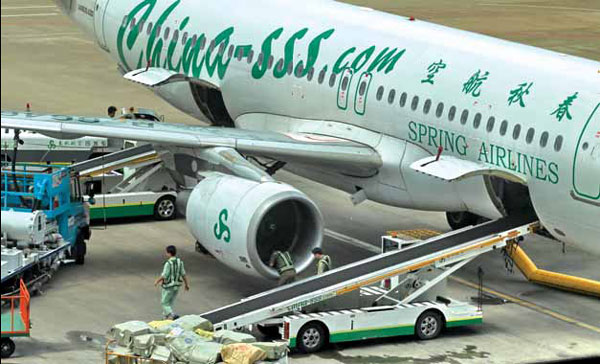Airline boss got off to a flying start
Updated: 2013-06-20 07:23
By Wang Ying in Shanghai (China Daily)
|
|||||||||||
|
A Spring Airlines' plane at Pudong International Airport, Shanghai. During the poor market in 2012, Spring Airlines maintained a seat-kilometer utilization of up to 95 percent, in stark contrast with the industry average of between 79 and 80 percent. Provided to China Daily |
Spring Airline sees sky-high potential in China's no-frills traveling market
Living in small and cheap hotels with two people sharing a room in downtown London or Singapore, making their own meals in the hotel kitchen with a pressure cooker brought from home, eating only porridge and pickles for dinner.
It doesn't seem much of a life, does it?
This is not one of those now banal inspirational stories of two partners at the start-up stage of building a later greatly successful enterprise but the real life of Spring Airlines' executives when they are on business trips.
As the nation's most successful private airline company and only budget carrier, Spring Airlines Co Ltd has established a strict cost control regime to maximize profits and outperform its State-owned competitors that have posted steep drops in earnings despite enjoying government subsidies.
"When we go to the conferences in London and Singapore, we take the bus or subway, not taxis," said Wang Zhenghua, founder and chairman of Spring Airlines.
According to an old Chinese saying, 70 is an age that people rarely reach but 70-year-old Wang is still full of energy and passion to make his carrier more successful and financially sound.
"We do everything possible to cut costs and that's the reason why we can offer extremely low ticket prices for passengers," Wang said.
According to him, the company's marketing expenditure is only 20 percent of its Chinese counterparts. Management costs are 30 to 40 percent lower than the market average.
Wang was not born an astute businessman. He first became an entrepreneur at the age of 40 after quitting public service in Shanghai. With start-up capital of 1,000 yuan and some preliminary research on China's tourism market, Wang discovered his own managerial talents.
Within 10 years, Wang turned Spring Travel Agency, which he established in 1981, into a leading tourism agency in China. But being ambitious and creative he was not satisfied resting on his laurels.
After gaining adequate experience in running the agency, he launched the low-cost Spring Airlines in 2004, a milestone in China's aviation history that enabled more Chinese people to afford to fly.
Although there is an unwritten law in the domestic aviation market that says no company will make a profit in its first three to four years of business, no matter how well it operates, Wang and his team shattered that myth by making a profit in its first year even though they only had three planes in operation.
Few would now disdain Wang and his dream, which is to emulate the huge success of the world's first budget carrier, Southwest Airlines. Currently, the Shanghai-based carrier has a fleet of 36, 14 of which are owned by the company.
"We plan to expand our fleet size to 60 by 2015. That's many more each year," Wang said.
Wang's aggressive expansion is backed by the carrier's much-higher-than-average seat-kilometer utilization, a key indicator to reflect a carrier's operating efficiency.
Today's Top News
France wants more Chinese investment
FM: China rejects US' claim on Snowden
Public interests Party's top priority
Overseas sellers upbeat on China
PBOC will act 'if necessary'
4 Chinese killed in Papua New Guinea
'Heavy losses' if China-EU solar sector talks fail
Riots in Xinjiang kill 27
Hot Topics
Lunar probe , China growth forecasts, Emission rules get tougher, China seen through 'colored lens', International board,
Editor's Picks

|

|

|

|

|

|






